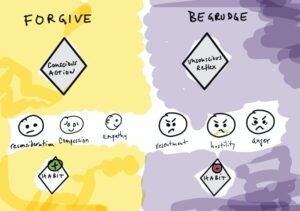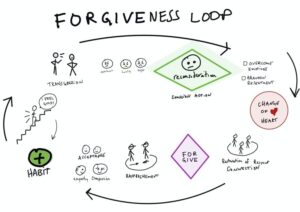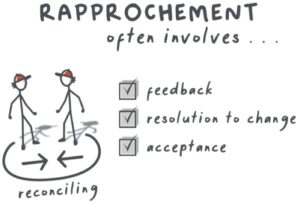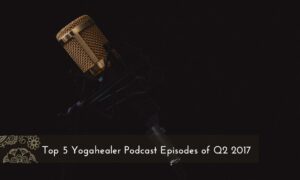Forgive all trespasses against thee. Hold no grudge. Unchain your heart. Free your mind. The sooner the better.
Forgiveness is a habit.
The Mayan moral code, Lak’ech Ala K’in, reads:
You are my other me.
What I do onto you, I do onto myself

Unsurprisingly, the forgiveness habit is an indicator of regenerative health. Karen Swartz, M.D., who directs the Mood Disorders Adult Consultation Clinic at Johns Hopkins says it this way:
“There is an enormous physical burden to being hurt and disappointed. Chronic anger puts you into a fight-or-flight mode, which results in numerous changes in heart rate, blood pressure and immune response. Those changes, then, increase the risk of depression, heart disease and diabetes, among other conditions. Forgiveness, however, calms stress levels, leading to improved health”.
Forgiveness kicks off the loop to create transformational change. No forgiveness, no transformation.
No Forgiveness, No Transformation
Forgiveness is a conscious effort that does not occur unintentionally.
The action is deliberately letting go of resentment towards the person who wronged you. You forgive whether the other is deserving or undeserving. Including forgiving yourself. No vengeance on yourself either.
What happens if I forgive the transgression?
Against myself? Against thee?
The load lightens.
The heart relaxes, physically.
The body exhales.
Forgiveness is an act.
The act can become your habit.
As you release you rewire your feelings from resentment to compassion, from anger to empathy, and sometimes even from hostility to affection. How?
Processing forgiveness generates feedback. The feedback is the next essential propeller for the loop to become transformational. Integrating the feedback is the third step.
The rapprochement part is where feedback is allowed to be received, … a bow of the ego which in the very act itself generates a particular revelation related to a specific circumstance.
No one wants to be in a disrespectful relationship, including you with yourself. In the habit of self-forgiveness you churn self-disdain into a modicum of self respect. Forgiveness towards yourself and everyone else follows the same path:
- You notice you are holding a grudge
- You pause to reconsider the root of the grudge
- This requires overcoming emotions and abandoning resentment. Good for you!
- You have a revelation, a crack f insight, a change of heart
- The feedback becomes obvious
- Rapprochement happens
- Forgiveness happens
- The feedback upcycles as a lesson learned, rewiring the entire experience as a positive stressor

Consider this: if you do not actively forgive, you generate an enemy in your mind. You can get triggered off your chosen path. If you do not thoroughly forgive, you do not fully heal.
To forgive, study rapprochement.

From French, rapprocher combines re– expressing intensive force with approcher – to approach.
That is exactly how every feedback/resolution cycle feels. In hot pursuit of resolution, rapprochement requires an intensive force to approach and express yourself. The express requires that you use accurate words combined with accurate feelings. Fake the funk doesn’t work for forgiveness.
Rapprochement is a process of replacing relationship destructive responses with relationship constructive actions.
Disrespect must be churned into respect.
Pride into humility.
Grievance into grace.
Resolution to change and behave differently in the future is often required for acceptance, for the relationship to move forward.
We grow through feedback.
Good parents have strong feedback loops for positive behaviors and negative behaviors. The same is true for good trainers and leaders of all sorts. With practice positive feedback loops the majority of the time. Forgiveness cycles happen faster. The atmosphere grows with connection.Rapprochement kindles the evolution of your relationships. Forgiveness rekindles the value.
Forgiveness as a Habit
Perhaps it looks something like this: You decide to forgive. Unequivocally, you decide to process each and all transgressions. Even your transgressions against yourself. To entertain a conscious change of heart until you digest and dissolve all emotional pain into inner resolution.
You build the habit of processing all transgressions and trespasses.
You see the benefit of the doubt, and also extend to yourself the benefit of the doubt.
You flex the habit of releasing others to their own path. You reconsider until you truly forgive.
P.s. FORGIVE is one of the #wildhabits. Join our challenge if you want to engage your edge of forgiveness.


